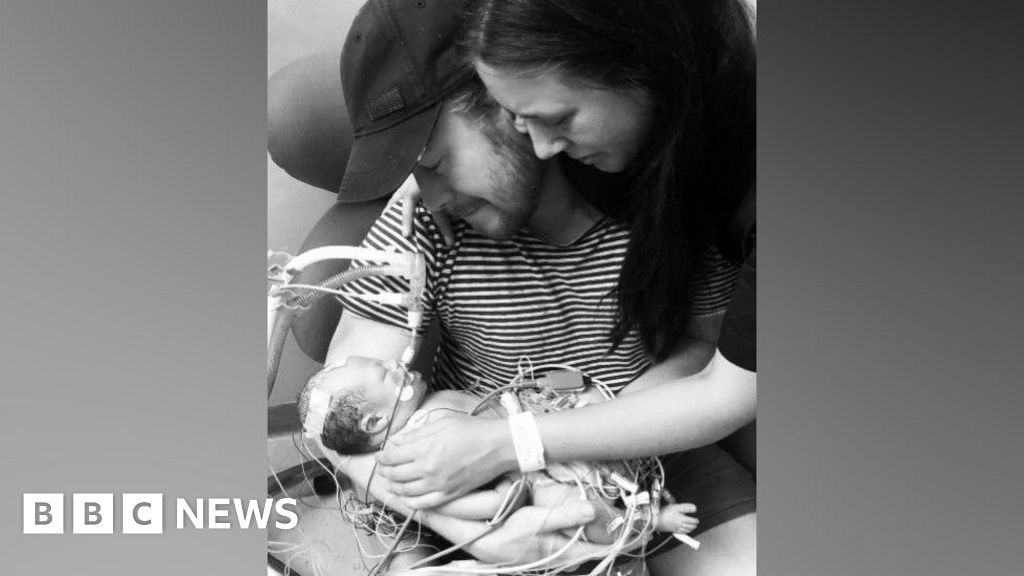BBC News, Nottingham
An NHS trust has been fined £1.6m for “avoidable failings” connected to the deaths of three babies in 2021.
Adele O’Sullivan, Kahlani Rawson and Quinn Parker died shortly after they were born – all within 14 weeks of each other – while under the care of Nottingham University Hospitals (NUH) NHS Trust.
The trust admitted six counts of failing to provide safe care and treatment to the babies and their mothers on Monday, following a prosecution brought by the healthcare watchdog, the Care Quality Commission (CQC).
On Wednesday, family members cried in the courtroom as district judge Grace Leong expressed her “deepest sympathy” to each of them, and said the trust they put in NUH to deliver their babies safely had been broken.
Adele died at just 26 minutes old on 7 April 2021, Kahlani died aged four days old on 15 June, and Quinn was two days old when he died on 16 July.
Nottingham Magistrates’ Court heard the fine was reduced from £5.5m, taking into account the trust’s financial position and guilty pleas.
The judge said there were similarities among the “catalogue of failures” across the cases, in which all the mothers suffered a placental abruption, a serious condition in which the placenta starts to come away from the wall of the womb.
She told the hearing, which was attended by NUH chief executive Anthony May, that the “catalogue of failures” in the trust’s maternity unit were “avoidable and should never have happened”.
Of the babies’ families, the judge added: “They placed their trust in a system meant to protect expectant mothers and keep babies safe – and that trust was broken.
“Three and a half years have gone by, yet for the families no doubt their grief remains as raw as ever and a constant presence in their lives that is woven into every moment.
“It is very difficult, if not impossible, to move on from the failures of the trust and its maternity unit.
“The weight of what should have been done different will linger indefinitely.”
Adele was born prematurely following an emergency Caesarean after her mother, Daniela O’Sullivan, noticed bleeding and suffered abdominal pains.
However, no vaginal examination was carried out and the court previously heard there was a delay in identifying that she was in labour.
An inquest into Adele’s death found a series of “missed opportunities” in her mother’s treatment, but could not say whether or not they led to the baby’s death.
In Kahlani’s case, his mother Ellise Rawson had complained of a lack of foetal movement days before she had to undergo an emergency Caesarean.
The trust said in an interview under caution that it accepted the monitoring in her case was poor “from the outset” and that key information about her condition had not been passed on to consultants.
A coroner said “failings in care” led to a 20-minute delay in carrying out an emergency Caesarean section.
The court heard Emmie Studencki went to hospital four times before her son Quinn was born in July 2021 after suffering bleeding.
On the final occasion, she called an ambulance after having a major antepartum haemorrhage.
Prosecuting on behalf of the CQC, Ryan Donaghue told the court it was recorded by a paramedic that she lost about 1,200ml of blood but “those records did not find their way to the hospital notes”.
Quinn was “pale and floppy” when he was delivered by emergency Caesarean section, the court heard.
An inquest found a series of errors contributed to his death.
‘Significant financial penalty’
The trust is currently subject of the the largest maternity review of its kind in NHS history, with about 2,500 cases being looked at.
It is the first trust to be prosecuted by the CQC more than once, after it was fined £800,000 in 2023 for failures in the care of Wynter Andrews, who died 23 minutes after being born at the Queen’s Medical Centre in Nottingham in September 2019.
The court heard the trust has an average turnover of £612m, and the judge said she was “acutely aware” that all its funds as a publicly-funded body were accounted for and that the trust was currently operating at a deficit of about £100m.
She said: “I can’t ignore the negative impact this will have… but the significant financial penalty has to be fixed to mark the gravity of these offences and hold the trust to account for their failings.”
At sentencing on Wednesday, the trust was also told to cover prosecution costs of £67,755.23 and ordered to pay a surcharge of £190.
